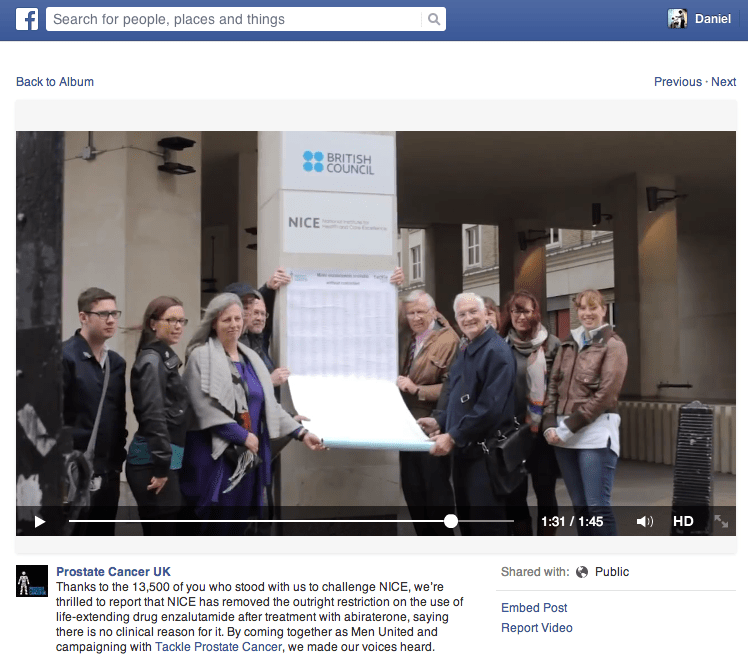On 19th March 2014, NICE, the National Institute for Health and Care Excellence which guides UK NHS spending on healthcare, held a committee meeting to appraise Astellas’ advanced prostate cancer drug Xtandi (enzalutamide) for use on the NHS for men who have already had chemotherapy.
Digital Opinion Leaders as Activists
The same day, Dr Carol Cooper, a doctor and journalist with significant influence online, posted a Tweet challenging NICE on its earlier decision to restrict access to the drug:
Men with #prostatecancer could be denied their last hope of survival by @NICEcomms. Pls RT to #challengeNICE #enzalutamide
— Carol Cooper 💙 (@DrCarolCooper) March 19, 2014
Dr Cooper’s Tweet was shared extensively online by others including academics, patient groups and patients.
Later the same day, Prostate Cancer UK also Tweeted, reaching out directly to a consultant urologist and senior lecturer at Guy’s Hospital in the UK, Ben Challacombe and asking him to ‘join the fight’:
@BenChallacombe pls RT: Final meeting today for @NICEcomms on vital #prostatecancer drug #enzalutamide. Join the fight & #challengeNICE
— Prostate Cancer UK (@ProstateUK) March 19, 2014
Ben Challacombe did indeed join the fight, sharing Prostate cancer UK’s Tweet, as did Nick James, a professor or Clinical Oncology specialising in urological cancer.
Prostate Cancer UK kept up its day of online campaigning, Tweeting again in the afternoon:
Last @NICEcomms meeting for vital drug #enzalutamide taking place now. Join @ProstateUK & #challengeNICE to remove restrictions
— Prostate Cancer UK (@ProstateUK) March 19, 2014
This Tweet was shared by healthcare professionals ranging from GPs to Urologists and a Consultant Professor at University of Warwick.
Prostate Cancer UK and Tackle Prostate Cancer also campaigned in person outside NICE’s office on the day of the meeting to deliver a petition signed by 13,000 people urging NICE to make enzalutamide available to all men with prostate cancer. According to the patient group’s Facebook page, Sir Andrew Dillon, NICE’s Chief Executive, invited a representative inside to discuss the petition.

Prostate Cancer UK posted a report on Facebook following action outside NICE’s office on the day of its committee meeting
NICE recommends Xtandi
Following the NICE committee meeting and online activism by patient groups and healthcare professionals, NICE issued final draft guidance last month recommending Xtandi for prostate cancer patients who have previously been treated with docetaxel. This was a significant move because, as NICE stated, its previous draft recommendations had not recommended the product for people who had previously been treated with Janssen’s Zytiga (abiraterone). In the new draft, this guidance has been removed, increasing access to Xtandi for a greater number of prostate cancer patients.
In a statement, NICE acknowledged the role of patient groups and professional organisations in its decision-making: “We run consultations that allow interested organisations and members of the public to comment on all of our guidance in draft format, before it is finalised. During consultation on the draft recommendations for using enzalutamide, we received a number of responses, including data and comments from the manufacturer of the drug, professional organisations and patient groups.”
Is NICE closing treatment door?
Despite the victory for Prostate Cancer UK and its activist peers, just a few days after the draft guidance on Astallas’ Xtandi, NICE issued preliminary guidance which does not recommend Janssen’s Zytiga for prostate cancer patients whose first treatment has failed and for whom chemotherapy is not yet clinically indicated.
Like its earlier initial guidance on Xtandi, the preliminary guidance on Zytiga will now enter a consultation process, during which NICE welcomes the views of healthcare professionals and others. In its statement about the Zytiga guidance, it says: “Consultees, including the manufacturer, healthcare professionals and members of the public are now able to comment on the preliminary recommendations which are available for public consultation. Comments received during this consultation will be fully considered by the committee and following this meeting the next draft guidance will be issued.”
It remains to be seen whether patient groups, healthcare professionals and others will rally behind Zytiga in the very visible way they did during the Xtandi hearing. But as the healthcare engagement landscape continues to evolve, the role of Digital Opinion Leaders in influencing policy and practice has never been more important.
This article was originally posted on pharmaphorum.
 By Daniel Ghinn
By Daniel Ghinn 

